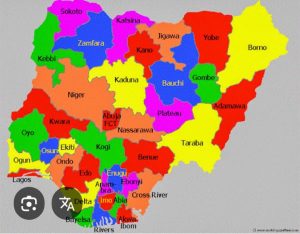

By Dada Ahmed.

(C) ResearchGate.
In a country as diverse and populous as Nigeria, where over 200 million citizens adhere to a tapestry of faiths,Islam, Christianity, and African Traditional Religions,religion is not just a private matter but a potent force shaping national identity, politics, culture, and even the economy. Yet, while religion has served as a pillar of hope and moral guidance for many, it has also, at times, been weaponized, leading to strife, violence, and division. As Nigeria continues its pursuit of sustainable development, the question arises: Can religious harmony be the missing link to national progress?
The historical narrative of Nigeria is replete with inter-religious tensions that have impeded national unity. From the Maitatsine riots of the 1980s to the more recent Boko Haram insurgency and sectarian violence in parts of Plateau, Benue, and Kaduna states, the misuse of religion has inflicted deep wounds on the nation’s fabric. These conflicts have not only claimed lives and property but have eroded trust among citizens, strained intergroup relations, and undermined socio-economic development.
Ironically, every major religion in Nigeria preaches peace, tolerance, compassion, and justice,values that are indispensable to national development. Islam, for instance,speaks of the Ummah, the universal brotherhood of believers; Christianity urges love for one’s neighbor; traditional African religions emphasize community solidarity and reverence for elders and ancestors. Experience, therefire, shows that the failure, therefore, lies not in religion itself, but in its manipulation for political or ethnic ends.
Religious harmony refers to the peaceful coexistence of diverse religious groups, each respecting the other’s rights, beliefs, and practices. Experts on religious affairs note that in a pluralistic state like Nigeria, fostering such harmony is not a luxury but a necessity. When faith communities collaborate rather than compete, they create an atmosphere where trust thrives, conflicts are minimized, and citizens can focus on productive endeavors.
One significant area where religious harmony fuels development is education. Faith-based institutions, both Islamic and Christian, have played pivotal roles in Nigeria’s educational landscape, especially in rural communities.. However, where religious bigotry thrives, access to such educational services becomes politicized, and communities are deprived of critical developmental tools. Harmony enables cross-religious partnerships that enhance access to quality education for all, irrespective of creed, experts in religious study hold the opinion.
Similarly, health care has benefited from religious collaboration. Missionary hospitals and Islamic health foundations have been instrumental in delivering essential medical services in some parts of the nation. In times of epidemics or pandemics,such as the Ebola and COVID-19 crises,religious leaders were key in disseminating public health information and combating misinformation.In such instance,united religious fronts help save lives and reinforce the government’s capacity for health delivery.
Religious harmony also promotes economic development. In regions where religious violence has displaced populations or destroyed markets, investment naturally declines. Foreign and local investors seek stable environments, and religious conflicts scare them away. On the flip side, peace nurtured by mutual religious tolerance leads to thriving commerce, job creation, and infrastructural development.
Moreover, harmonious inter-religious relations foster good governance. Politicians often exploit religious sentiments to divide the electorate, skew appointments, or manipulate outcomes. When citizens are religiously polarized, they vote along sectarian lines rather than based on competence or integrity. Conversely, a religiously harmonious society can hold leaders accountable, irrespective of religious affiliations, strengthening democracy and institutional transparency.
Another often overlooked but critical domain is interfaith dialogue. Platforms like the Nigeria Inter-Religious Council (NIREC), Guild of Interfaith Media Practitioners and grassroots initiatives by faith-based NGOs have shown that dialogue not only reduces suspicion but also builds coalitions for social justice, disaster relief, and peacebuilding. These conversations must be supported, strengthened,institutionalized, and expanded into schools, workplaces, and community centers.
Furthermore, religious leaders wield immense influence in Nigeria. Their voices resonate more powerfully than many political actors. When they preach peace, tolerance, and national unity, they shape public opinion and promote a national ethos that prioritizes collective progress over sectarian interests. Therefore, equipping these leaders with interfaith skills and national integration perspectives is an investment in Nigeria’s future.
Cultural and religious festivals, when managed inclusively, also provide avenues for unity. Events like Eid, Christmas, and New Yam festivals, when opened to participation by other faith groups, become platforms for cultural exchange, mutual respect, and community bonding. They remind Nigerians that shared humanity transcends doctrinal differences.
For religious harmony to thrive, the state must also maintain a neutral, secular posture while ensuring that freedom of religion, as enshrined in the Constitution, is protected. Policies must not favor one religion over another, and appointments or public resource allocation must be devoid of sectarian bias to promote a sense of belonging and equal citizenship.
Education curricula at all levels must inculcate values of religious tolerance, civic responsibility, and historical understanding of Nigeria’s religious diversity. Children must grow up appreciating religious differences not as threats, but as enriching dimensions of a plural society. Early intervention can reduce the indoctrination that fuels fanaticism in adulthood.
The media, too, has a vital role to play. If we all believe that irresponsible reporting can bring about religious conflicts,it means that ethical journalism, balanced coverage, and deliberate promotion of inter-religious success stories can shift narratives from conflict to cooperation.Thetefore media houses must lead this transformation through informed and constructive discourse and reportage of religious issues to ensure peace.
In the final analysis,it must be stressed that religious harmony is more than just a lofty ideal,indeed,it is a practical pathway to Nigeria’s sustainable development. From education to health, governance to economic stability, the dividends of peace among faith communities are tangible and far-reaching. Nigeria must invest deliberately in structures, education, dialogue, and leadership that nurture such harmony. Only then can Nigeria realize its full potential as a diverse, united, and prosperous nation.
Ahmed, an Editorial Advisor for Guild of Interfaith Media Practitioners,GIMP,publishes The Reporters.
ahmeddada008@gmail.com.


